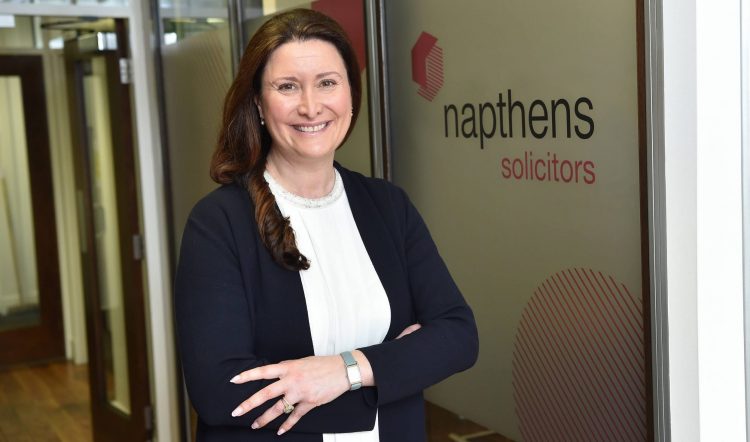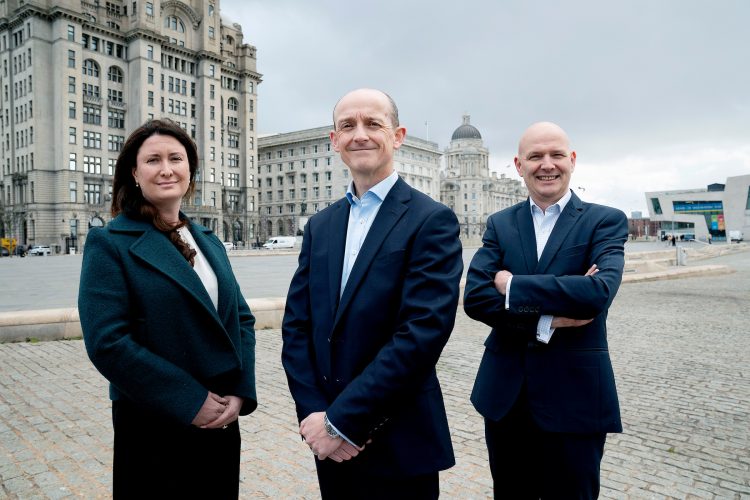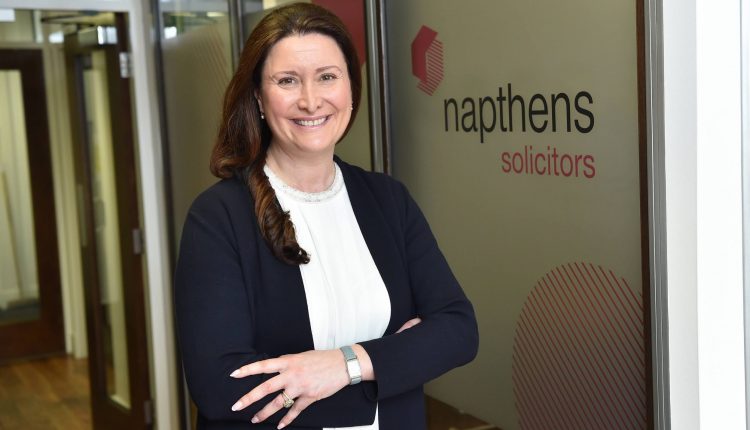Profile: Napthens CEO looks to build a ‘Tesla law firm’
New CEO of Napthens Alex Hatchman tells LBN of her admiration for Jürgen Klopp and her ambition to transform the law firm with customer-focused technology. Tony McDonough reports

A background in engineering and the automotive sector isn’t an immediately obvious advantage when it comes to running a corporate law firm.
However, Alex Hatchman, new chief executive of Napthens, can’t resist an automotive analogy when asked about her vision for the firm. She said: “I have to admit I’m a bit of a geek. What I want to build at Napthens is a Tesla law firm.
“You could compare law firms to cars. Some are like Mark 1 Ford Escorts. At Napthens my ambition is to serve customers brilliantly, and as many of them as possible. I want it to be an intelligent vehicle and use technology to better deliver our services to our customers.”
Alex joined Napthens in February this year. Back in September 2020 she became the first female chief executive of Southport law firm Fletchers Solicitors. Under her leadership Fletchers enjoyed a record financial performance. Annual revenues soared 40% to £44.7m and pre-tax profits also rose 39% to almost £5.5m.
In autumn 2021, Alex departed Fletchers after US-based private equity outfit Sun European Partners acquired the firm.
Born in Wirral, Alex studied engineering at university and started her career in the automotive sector. She worked for Ford in the US and Spain. But it was in retail where she really forged her reputation. She took on senior roles at Marks & Spencer, Tesco and Accenture. Her job took her to multiple countries across the world.
Retail was one of the first business sectors to be transformed by the rapid growth of the internet. Alex was at the vanguard of significant changes in the way businesses operate and how they interacted with their customers. She is now keen to take Napthens on a similar transformational journey.
Headquartered in Preston, Napthens has offices in Liverpool, Manchester, Preston, Kendal, Blackburn, Lytham and Southport. It employs around 300 people and focuses on both individual and business customers.
Its specialist areas include corporate finance, commercial property, dispute resolution and HR. For individuals its services include family law, wealth management, wills and probate and residential property.
In the last few weeks the firm has installed “established dealmaker” Kieran Donovan as partner and new head of its Liverpool office. He joins another local big hitter, Gareth McIntegart, heading up the 40-strong team at The Plaza in St Paul’s Square.
“Gareth isn’t from Liverpool but he has lived and worked here for a long time and I think he is seen as a local,” said Alex. “Kieran is from Liverpool and I am from the Wirral. So Liverpool city region is a big priority for me and for Napthens.
“If you care about your customers then you must understand how they think and feel. You have to know how to serve them and I feel we have a team here who can do that – and I can do that, too.
“There is a gap in Liverpool for a strong corporate finance offer and when you speak to Kieran in the office here he has such a passion for that. The same goes for Gareth.
“I think in Liverpool dealing with people from within the city is important for customers. In Manchester that is less important. In that sense, if you are based in Liverpool then you have an opportunity.”
It has been a few years now since non-lawyers have been allowed to run law firms. However, Alex says there is still some resistance to the idea within the sector. And this fits in with her idea of positioning Napthens as a ‘Tesla’ law firm – a vehicle for transformation.
She explained: “In retail you would have to collaborate. There are industry bodies for collaboration and it was an absolutely normal thing to do. The legal sector is still a bit more competitive. I like having relationships with other law firms. That is how I want to work in the future.
“In law there is a whole spectrum of outlooks. On one hand you have these really traditional partnerships. And then you have the law techs – the real digital innovators. There are very few of those. They are firms who want to bring services to the market in completely different ways.
“Napthens sits in the middle. And I think there is a real appetite to move in a direction which embraces all of the technological change. But change isn’t just driven by technology. It is driven by the customer. They want to be served in a certain way and technology is one of the channels to deliver that.”
Not using technology for the sake of technology is something Alex is quite clear on. Digital transformation and new processes must, she insists, be customer-led. She added: “It varies by segment within the law. Forces that shape each industry are different. Customers are different, regulation is different.
“My background was retail and clearly in that sector we were very strongly shaped by customer forces. The law isn’t really shaped in that same way. The revenue in food retail is about three times that of the law. But the profitability in food retail is about half of that in the law – and that is extraordinary.
“I think the best law firms need to be driven by the customer. And that might mean, at times, law firms do have to sacrifice some margin. If you look at Amazon. They have really put the customer at the heart of their business. People want to be served in different ways and we have to be part of that change.”
Two years of COVID has seen huge change across many businesses and the law has not escaped this. Working from home (WFH) and the extent people can work flexibly is a hot topic in the corporate world.
“Before COVID happened, I used to work a day a week at home if I could,” said Alex. “Time in the office was really important although it meant I was disrupted a lot. That one day a week at home allowed me quiet time to get the thinking and the planning done.
“Then COVID happened and many of us moved to working from home quite seamlessly. In businesses where there were a lot of established relationships that transition was much easier. But attrition levels in many businesses are now running at 20% and, in some places, higher than 20%.
“And what that means is you are having a fresh 20% of people coming into your business who don’t have those pre-existing relationships. That makes WFH more of a challenge. 70% of our language is meant to be body language. We need to swing into a happy medium.
“If there is a big transaction being handled by the corporate team then you need the team in one place pulling together. But there are other parts of the law, for example wills and probate, which are less team-oriented jobs.
“Where you are being collaborative and innovative then I think that is where you need a team around.”
During the pandemic working from home meant many people could ditch the traditional work attire. Even for Zoom meetings people would often only dress smartly from the waist up. And this hasn’t just meant a change in what we wear, said Alex, but also an altering of our mindsets.
“One of the few advantages of the pandemic is that it has given us permission to be a little more human,” she said. “My work wardrobe now has a whole range depending on where I am working.
“When I graduated my wardrobe was very narrow. It was definitely a suit and heels and all of that. Now it can go from that right through to my pyjamas. And that, for me, has been a real marked change. I have gotten to a point where I no longer need permission to be me.
“You have to form good relationships with your customers. You do what they call in psychology ‘mirroring and matching’. So it can actually help if you mirror and match your customers in casual wear.”
On the challenges of recruitment and retention, Alex acknowledges law firms are operating in a tough environment. But she also sees opportunity in the challenge. For example, creating a more diverse organisation.
In terms of entry-level, women coming into the law have been outnumbering men for a number of years. However, that change has been slower the higher up the ladder with men still occupying the bigger share of management positions.
Alex has publicly championed the push to inject more diversity into leadership. Not only is it the right thing to do but it also makes business sense, she says. A more diverse team is better equipped to thrive in a changing world.
Leadership is changing,” she explained. “If you think about it in football terms, would Sir Alex Ferguson be as successful now in the current environment as Jürgen Klopp is? I don’t think so.
“Sir Alex controlled everything in his day. But Jürgen Klopp has a much more collegiate approach. So what makes a successful leader 20 years ago doesn’t necessarily make one today. One of the things that I am aware of is that there is a much wider range of leadership styles now.


“And that is great because it means diversity can genuinely have an opportunity – and it needs an opportunity. I am glad that it is changing. And I feel strongly that these conversations need to be rooted in data.
“Look at the top countries in the world by population and look how many have female leaders. Hardly any. I have a son aged 10, and a daughter who is eight. My husband and I want them both to have the same opportunity for the same effort. And I don’t yet have the confidence that will be the case.
READ MORE: ‘We must not pull the ladder up behind us’, says Alex Hatchman
“Recruitment is tough everywhere at the moment. But if you treat people properly then you can retain the people you have got and you don’t have to do much recruitment. It is like a football team. You need to have people in different positions. You need people with different skills and talents. It is exactly the same principle in a law firm.”
Settling in at Napthens has so far been smooth for Alex. She had already dealt with the firm as a client and had established strong professional relationships. She said joining felt like “putting on an old slipper”.
“Napthens is such a North West-centric business and I am such a North West person,” said said “I come from Merseyside. My father is from Lancashire. It has been a really easy transition I am glad to say.”
While growth of the business is a vital part of her mission, Alex cautions against the idea of “empire-building”. She believes spending money just to increase the firm’s geographical footprint isn’t necessarily the best way to go.
“I have an ambition to go where clients need us,” she added. “An ambition to serve customers brilliantly and as many of them as possible. That to me is a different ambition. It is about putting the customer at the heart.
“Leaders of businesses have to be careful not to be driven by ego. It is not about growing an empire for me. I have seen people do that and burn a lot of money. It is about customers. Change has to be about them.
“A lot of legal services can be distress requirements – it could be an employment problem, or a divorce or a legal dispute. Having that really good rapport with your lawyer is critical. That is how I would want to be served.
“With the internet, the internet of things and artificial intelligence we are experiencing three revolutions in one lifetime. That is far more than previous generations. The acceleration has been profound.
“Business culture is changing too. Look how many companies have pulled out of Ukraine since the Russian invasion. That didn’t happen in 2014 when Russia invaded Crimea. It shows how the expectation of how we all do business has changed.
“And I am really glad about that because it will lead to a better world. The current generation is doing things I wish I had done.”

